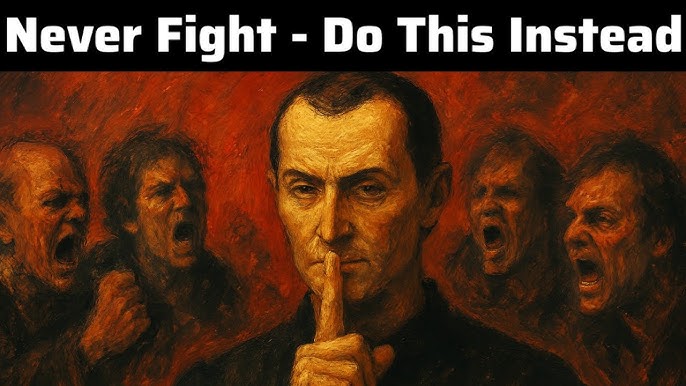Machiavelli’s 5 Rules to Never Get Backstabbed
Estimated reading time: 8 minutes
In business and leadership, trust is everything until it’s not. Betrayal doesn’t just hurt personally, it can derail careers, sink startups, and destroy professional relationships. Centuries ago, Niccolò Machiavelli wrote The Prince, a brutally honest guide on power and survival. Today, his strategies are more relevant than ever in navigating cutthroat industries, competitive markets, and even office politics.
Here’s the truth: People don’t betray you because they’re evil. They do it because they see an opportunity, a weakness, or no consequences. The good news? You can protect yourself without becoming ruthless. These five Machiavellian rules updated with modern psychology and business insights will help you spot betrayal before it happens and respond strategically.
1. Weaponize Calculated Kindness
Being kind doesn’t mean being naive. Machiavelli warned that unchecked generosity makes you an easy target. Modern leadership experts agree: kindness must be transactional and observational.
How to Apply This:
- Give to test, not just to help: Offer small favors or opportunities and watch how people respond. Do they reciprocate? Do they take advantage?
- Set invisible boundaries: Be helpful, but never let people assume your support is unlimited. Example: “I’m happy to advise on this project, but I’ll need your input on my initiative next week.”
- Watch for entitlement: If someone expects your help without gratitude or effort, they’re likely to exploit bigger opportunities later.
This isn’t about being cold. it’s about ensuring your kindness builds loyalty, not dependency.
2. Silence as Strategic Leverage
Most people can’t resist filling silence. That’s why Machiavelli advised leaders to “speak less, observe more.” In negotiations, conflicts, or even casual conversations, staying quiet forces others to reveal their true intentions.
Why It Works:
- Power dynamics shift: When you don’t react emotionally, you appear in control. The other person often panics and over-explains.
- Information advantage: In business deals, the first person to break silence usually concedes more.
- Avoids missteps: Reacting instantly to gossip or accusations often escalates drama. Pausing lets you craft a smarter response.
Pro Tip: Practice the “3-second rule.” Before responding to anything sensitive, pause for three seconds. You’ll respond strategically, not impulsively.
3. Preempt Through Proof Gathering
Betrayal rarely comes out of nowhere. There are usually warning signs. broken promises, inconsistent stories, or sudden secrecy. Machiavelli’s modern equivalent? Document everything before confronting.
How to Build a Paper Trail:
- Behavioral logs: Note patterns. e.g., a colleague who “forgets” commitments when it benefits them.
- Save communications: Emails, texts, or meeting notes that contradict someone’s later claims.
- Third-party validation: Casually loop in witnesses. Example: After a verbal agreement, send a recap email: “As we discussed, you’ll handle X by Friday. Let me know if anything changes!”
This isn’t paranoia, it’s due diligence. In business disputes, the person with proof wins.
4. Engineer Finality in Retaliation
Machiavelli’s most controversial rule: If you must retaliate, do it decisively. Half-measures (like passive-aggressive comments or vague warnings) invite further attacks.
Modern Retaliation Done Right:
- Remove their capacity to harm: Expose lies to decision-makers, or cut off access to your network.
- Protect your reputation: If someone slanders you, respond once with irrefutable facts then ignore. Overreacting makes you look guilty.
- Set a precedent: People notice how you handle betrayal. A firm, professional response deters future issues.
Key Insight: Retaliation isn’t about revenge. it’s about sending a message that betrayal has real costs.
5. Master Perception Warfare
In business, perception often overrides reality. Machiavelli knew this: Leaders who control narratives control outcomes.
Tactics to Steer Perceptions:
- Controlled ambiguity: Keep plans slightly vague so competitors can’t anticipate your moves.
- Stoic composure: Never let rivals see you rattled. Emotional control strategic advantage.
- Contextual theatrics: Sometimes, appearing “vulnerable” (e.g., admitting a small mistake) lures overconfident opponents into bigger errors.
Example: A startup founder facing investor doubts might say, “We’re refining our strategy,” instead of, “We’re struggling.” Both could be true but one frames challenges as intentional progress.
The Bottom Line
Machiavelli’s rules aren’t about manipulation they’re about awareness. In entrepreneurship, leadership, and even global economies, trust is a currency. These strategies help you spend it wisely.
- Kindness with eyes open builds stronger alliances.
- Silence reveals more than words ever will.
- Proof is power in conflicts.
- Retaliation, when needed, must be decisive.
- Perception shapes reality manage yours deliberately.
The goal isn’t to distrust everyone but to recognize that not everyone plays by the same rules. Protect yourself, and you’ll build relationships that are both and all people can be successful and secure. Because only you may be the one with good intentions and others may not.








